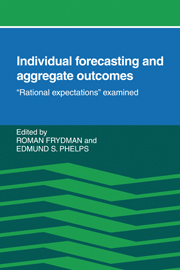Book contents
- Frontmatter
- Contents
- List of contributors
- Preface
- 1 Introduction
- 2 The trouble with “rational expectations” and the problem of inflation stabilization
- 3 Expectations of others' expectations and the transitional nonneutrality of fully believed systematic monetary policy
- 4 The stability of rational expectations in macroeconomic models
- 5 Individual rationality, decentralization, and the rational expectations hypothesis
- 6 Convergence to rational expectations equilibrium
- 7 A distinction between the unconditional expectational equilibrium and the rational expectations equilibrium
- 8 On mistaken beliefs and resultant equilibria
- 9 Equilibrium theory with learning and disparate expectations: some issues and methods
- 10 Keynesianism, monetarism, and rational expectations: some reflections and conjectures
- Index
9 - Equilibrium theory with learning and disparate expectations: some issues and methods
Published online by Cambridge University Press: 05 June 2012
- Frontmatter
- Contents
- List of contributors
- Preface
- 1 Introduction
- 2 The trouble with “rational expectations” and the problem of inflation stabilization
- 3 Expectations of others' expectations and the transitional nonneutrality of fully believed systematic monetary policy
- 4 The stability of rational expectations in macroeconomic models
- 5 Individual rationality, decentralization, and the rational expectations hypothesis
- 6 Convergence to rational expectations equilibrium
- 7 A distinction between the unconditional expectational equilibrium and the rational expectations equilibrium
- 8 On mistaken beliefs and resultant equilibria
- 9 Equilibrium theory with learning and disparate expectations: some issues and methods
- 10 Keynesianism, monetarism, and rational expectations: some reflections and conjectures
- Index
Summary
Introduction
Motivated by certain stylized facts or observations, and perhaps by a desire to develop models that offer a reliable guide for policy, economists have developed equilibrium models that are more and more sophisticated in their treatment of time and imperfect information. The profession has witnessed a movement from static models to dynamic models with perfect foresight and, more recently, with the advances of Muth (1961), Lucas and Prescott (1971), and Lucas (1972, 1975), among others, to dynamic models with uncertainty and rational expectations. Muth's work (1961) was motivated by two major conclusions from studies of expectations data: “1. Averages of expectations in an industry are more accurate than naive models and as accurate as elaborate equation systems, although there are considerable cross-sectional differences of opinion. 2. Reported expectations generally underestimate the extent of changes that actually take place.” Muth goes on to invoke his rational expectations hypothesis, “that the expectations of firms (or, more generally, the subjective probability distribution of outcomes) tend to be distributed, for the same information set, about the prediction of the theory (or the ‘objective’ probability distributions of outcomes)” and to establish that both the periodic movement of time series displayed in so-called corn-hog cycles and the second preceding observation can be explained with that hypothesis.
- Type
- Chapter
- Information
- Individual Forecasting and Aggregate Outcomes'Rational Expectations' Examined, pp. 169 - 202Publisher: Cambridge University PressPrint publication year: 1984
- 5
- Cited by



